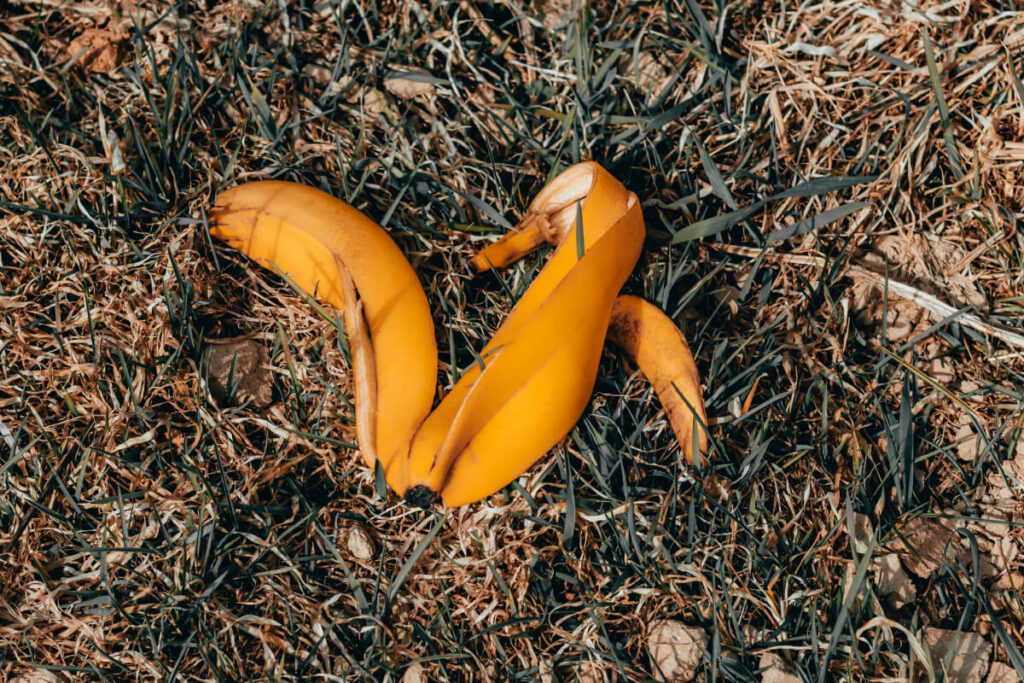Bananas are delicious fruits that come in various sizes and colors, and they’re rich in nutrients like potassium. Bananas are a popular snack that hikers take on the trail with them, but that should stop.
Banana peels will decompose, but it’s a slow decomposition process. How long does it take for a banana peel to decompose?
This article will discuss the specifics of banana peel decomposition and how long it takes.
How Long Does a Banana Peel Take to Decompose?
Banana peels will usually take around 6-9 months to decompose in a well-maintained compost pile, but up to two years by itself. They are biodegradable, but they decompose very slowly.
The slow decomposition process is why banana peels should not just be thrown on the ground after eating the banana.
Many people will throw away banana peels while hiking on trails in the woods, because they think that bananas are natural and will decompose by itself. While peels will decompose, it will just take many months and even years.
For comparison to banana peels taking up to 2 years to decompose, orange peels can take up to 6 months and apple cores will take up to 2 months.

Why Do Banana Peels Decompose Slowly?
Banana peels do decompose, but not as quickly as you might think. Bananas actually stay fresh longer than other fruits because bananas contain high levels of potassium. This helps maintain the moisture content of the fruit, keeping it fresher longer.
Banana peels take a long time to decompose because bananas contain lots of water. That makes them very wet. Moisture is needed by microbes to grow and reproduce. When bananas rot away, there are lots of microbes inside them. Microbes eat the banana peels. This process takes a long time.
Microbes require oxygen to decompose. Banana peels decompose faster when there is more oxygen available.
Landfills Do Not Allow a Banana Peel to Decompose Properly
Landfills are places where waste products are dumped. Composting is a process by which organic matter such as food scraps and yard trimmings are converted into an earth-friendly fertilizer.
In order to be considered a safe place to dump waste, landfills must meet certain criteria. For example, they should be located far away from residential areas and bodies of water. Also, they should be lined with impermeable material to prevent leaching of toxic substances into groundwater.
Landfills are not suitable areas for growing plants because of all the non-organic waste there. The temperatures there are too low for plant growth. The temperature of landfills drops during winter, and stays cold for several months of the year. This makes them unsuitable for growing plants.
The landfill piles also do not allow for proper oxygen flow, which microbes need to break down kitchen scraps and other organic matter.
That means banana peels should be buried in landfills because they won’t decompose properly there. Fruit peels stick around for a long time in landfills.
Where Do Banana Peels Decompose Quickest?
Compost piles are the best location if you want to help banana peels decompose the most efficiently and quickest.
Learn more about the basics of composting and how to start composting.
Compost piles are ideal locations for banana peels to decompose. They have plenty of air circulation and enough space for the banana peels to decompose.
If you don’t have access to a compost pile, then you could bury your banana peels in a hole or container in your backyard.
Banana peels can be used to make compost! This is a great way to recycle your kitchen waste into something useful for your plants.
Composting is a great way to reduce the amount of garbage you produce. You can use this knowledge to help save our planet by reducing the amount of trash we throw away.
Another option for banana peels is to create your own organic liquid fertilizer by learning how to make banana peel water. It’s a great plant fertilizer that’s loaded with potassium nutrients.
Learn more about composting other items:

